CHAPTER TWELVE
INTELLECTUALS ON COMMUNITY
Best-selling author Francis Fukuyama is bold in proclaiming that history has had a 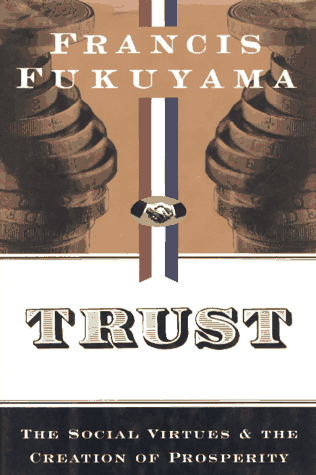 goal
that culminates in democratic capitalism. His book The End of History and the Last Man
generated a lot of discussion in the intellectual community. He is correct in that the
goal of history is democracy and capitalism. In his book Trust: The Social Virtues and
the Creation of Prosperity he is also correct in seeing that democracy and capitalism
are not enough for a prosperous society. A nation must also have strong religious and
ethical values which is what the Founding Fathers of America said and Fukuyama quotes. He
is also correct in being on the conservative side and not for big government.
goal
that culminates in democratic capitalism. His book The End of History and the Last Man
generated a lot of discussion in the intellectual community. He is correct in that the
goal of history is democracy and capitalism. In his book Trust: The Social Virtues and
the Creation of Prosperity he is also correct in seeing that democracy and capitalism
are not enough for a prosperous society. A nation must also have strong religious and
ethical values which is what the Founding Fathers of America said and Fukuyama quotes. He
is also correct in being on the conservative side and not for big government.
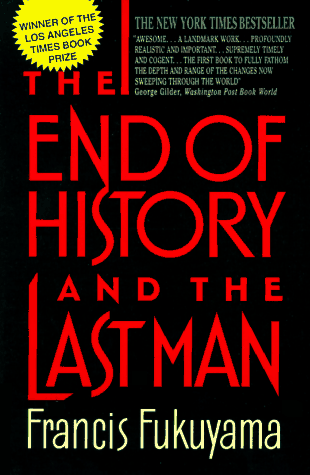
Francis Fukuyama
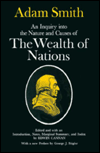
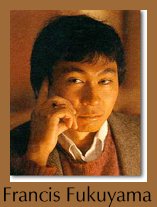 He writes like Adam Smith who praised capitalism in Wealth of Nations
and then praised morality in Theory of Moral Sentiments. The two motifs in his book
is that democracy and capitalism are the end result of politics and economics, but they
can only work if people have good morals, habits and ethics. People want to have freedom
to make money, but they also want what he calls "recognition": "The
satisfaction we derive from being connected to others in the workplace grows out of a
fundamental human desire for recognition. As I argued in The End of History and the
Last Man, every human being seeks to have his or her dignity recognized by other human
beings. Indeed, this drive is so deep and fundamental that it is one of the chief motors
of the entire human historical process." He says in the past "kings and princes
fought bloody battles with one another for primacy." Now the fight for recognition is
in "economic activity" which "represents a crucial part of social life and
is knit together by a wide variety of norms, rules, moral obligations, and other habits
that together shape the society."
He writes like Adam Smith who praised capitalism in Wealth of Nations
and then praised morality in Theory of Moral Sentiments. The two motifs in his book
is that democracy and capitalism are the end result of politics and economics, but they
can only work if people have good morals, habits and ethics. People want to have freedom
to make money, but they also want what he calls "recognition": "The
satisfaction we derive from being connected to others in the workplace grows out of a
fundamental human desire for recognition. As I argued in The End of History and the
Last Man, every human being seeks to have his or her dignity recognized by other human
beings. Indeed, this drive is so deep and fundamental that it is one of the chief motors
of the entire human historical process." He says in the past "kings and princes
fought bloody battles with one another for primacy." Now the fight for recognition is
in "economic activity" which "represents a crucial part of social life and
is knit together by a wide variety of norms, rules, moral obligations, and other habits
that together shape the society."
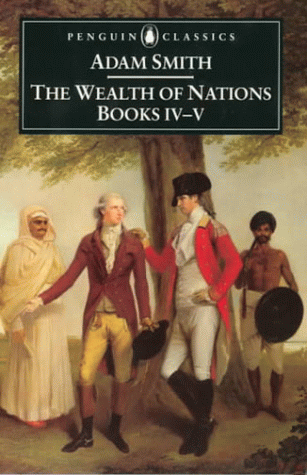
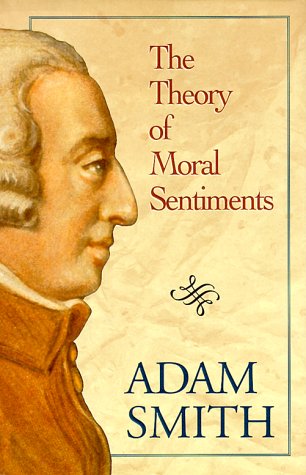
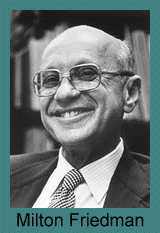 He is
against big government and for high standards of morality and ethics: "Over the past
generation, economic thought has been dominated by neoclassical or free market economists,
associated with names like Milton Friedman, Gary Becker, and George Stigler. The rise of
the neoclassical perspective constitutes a vast improvement from earlier decades in this
century, when Marxists and Keynesians held sway. We can think of neoclassical economics as
being, say, eighty percent correct: it has uncovered important truths about the
nature of money and markets because its fundamental model of rational, self-interested
human behavior is correct about eighty percent of the time. But there is a missing twenty
percent of human behavior about which neoclassical economics can give only a poor account.
As Adam Smith well understood, economic life is deeply embedded in social life, and it
cannot be understood apart from the customs, morals, and habits of the society in which it
occurs. In short, it cannot be divorced from culture."
He is
against big government and for high standards of morality and ethics: "Over the past
generation, economic thought has been dominated by neoclassical or free market economists,
associated with names like Milton Friedman, Gary Becker, and George Stigler. The rise of
the neoclassical perspective constitutes a vast improvement from earlier decades in this
century, when Marxists and Keynesians held sway. We can think of neoclassical economics as
being, say, eighty percent correct: it has uncovered important truths about the
nature of money and markets because its fundamental model of rational, self-interested
human behavior is correct about eighty percent of the time. But there is a missing twenty
percent of human behavior about which neoclassical economics can give only a poor account.
As Adam Smith well understood, economic life is deeply embedded in social life, and it
cannot be understood apart from the customs, morals, and habits of the society in which it
occurs. In short, it cannot be divorced from culture."
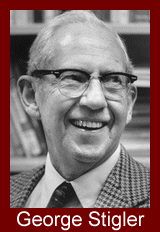
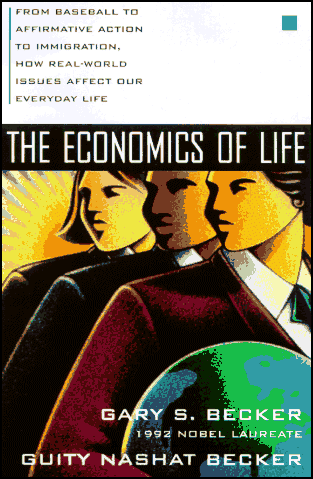
 goal
that culminates in democratic capitalism. His book The End of History and the Last Man
generated a lot of discussion in the intellectual community. He is correct in that the
goal of history is democracy and capitalism. In his book Trust: The Social Virtues and
the Creation of Prosperity he is also correct in seeing that democracy and capitalism
are not enough for a prosperous society. A nation must also have strong religious and
ethical values which is what the Founding Fathers of America said and Fukuyama quotes. He
is also correct in being on the conservative side and not for big government.
goal
that culminates in democratic capitalism. His book The End of History and the Last Man
generated a lot of discussion in the intellectual community. He is correct in that the
goal of history is democracy and capitalism. In his book Trust: The Social Virtues and
the Creation of Prosperity he is also correct in seeing that democracy and capitalism
are not enough for a prosperous society. A nation must also have strong religious and
ethical values which is what the Founding Fathers of America said and Fukuyama quotes. He
is also correct in being on the conservative side and not for big government.

 He writes like Adam Smith who praised capitalism in Wealth of Nations
and then praised morality in Theory of Moral Sentiments. The two motifs in his book
is that democracy and capitalism are the end result of politics and economics, but they
can only work if people have good morals, habits and ethics. People want to have freedom
to make money, but they also want what he calls "recognition": "The
satisfaction we derive from being connected to others in the workplace grows out of a
fundamental human desire for recognition. As I argued in The End of History and the
Last Man, every human being seeks to have his or her dignity recognized by other human
beings. Indeed, this drive is so deep and fundamental that it is one of the chief motors
of the entire human historical process." He says in the past "kings and princes
fought bloody battles with one another for primacy." Now the fight for recognition is
in "economic activity" which "represents a crucial part of social life and
is knit together by a wide variety of norms, rules, moral obligations, and other habits
that together shape the society."
He writes like Adam Smith who praised capitalism in Wealth of Nations
and then praised morality in Theory of Moral Sentiments. The two motifs in his book
is that democracy and capitalism are the end result of politics and economics, but they
can only work if people have good morals, habits and ethics. People want to have freedom
to make money, but they also want what he calls "recognition": "The
satisfaction we derive from being connected to others in the workplace grows out of a
fundamental human desire for recognition. As I argued in The End of History and the
Last Man, every human being seeks to have his or her dignity recognized by other human
beings. Indeed, this drive is so deep and fundamental that it is one of the chief motors
of the entire human historical process." He says in the past "kings and princes
fought bloody battles with one another for primacy." Now the fight for recognition is
in "economic activity" which "represents a crucial part of social life and
is knit together by a wide variety of norms, rules, moral obligations, and other habits
that together shape the society." 

 He is
against big government and for high standards of morality and ethics: "Over the past
generation, economic thought has been dominated by neoclassical or free market economists,
associated with names like Milton Friedman, Gary Becker, and George Stigler. The rise of
the neoclassical perspective constitutes a vast improvement from earlier decades in this
century, when Marxists and Keynesians held sway. We can think of neoclassical economics as
being, say, eighty percent correct: it has uncovered important truths about the
nature of money and markets because its fundamental model of rational, self-interested
human behavior is correct about eighty percent of the time. But there is a missing twenty
percent of human behavior about which neoclassical economics can give only a poor account.
As Adam Smith well understood, economic life is deeply embedded in social life, and it
cannot be understood apart from the customs, morals, and habits of the society in which it
occurs. In short, it cannot be divorced from culture."
He is
against big government and for high standards of morality and ethics: "Over the past
generation, economic thought has been dominated by neoclassical or free market economists,
associated with names like Milton Friedman, Gary Becker, and George Stigler. The rise of
the neoclassical perspective constitutes a vast improvement from earlier decades in this
century, when Marxists and Keynesians held sway. We can think of neoclassical economics as
being, say, eighty percent correct: it has uncovered important truths about the
nature of money and markets because its fundamental model of rational, self-interested
human behavior is correct about eighty percent of the time. But there is a missing twenty
percent of human behavior about which neoclassical economics can give only a poor account.
As Adam Smith well understood, economic life is deeply embedded in social life, and it
cannot be understood apart from the customs, morals, and habits of the society in which it
occurs. In short, it cannot be divorced from culture." 
